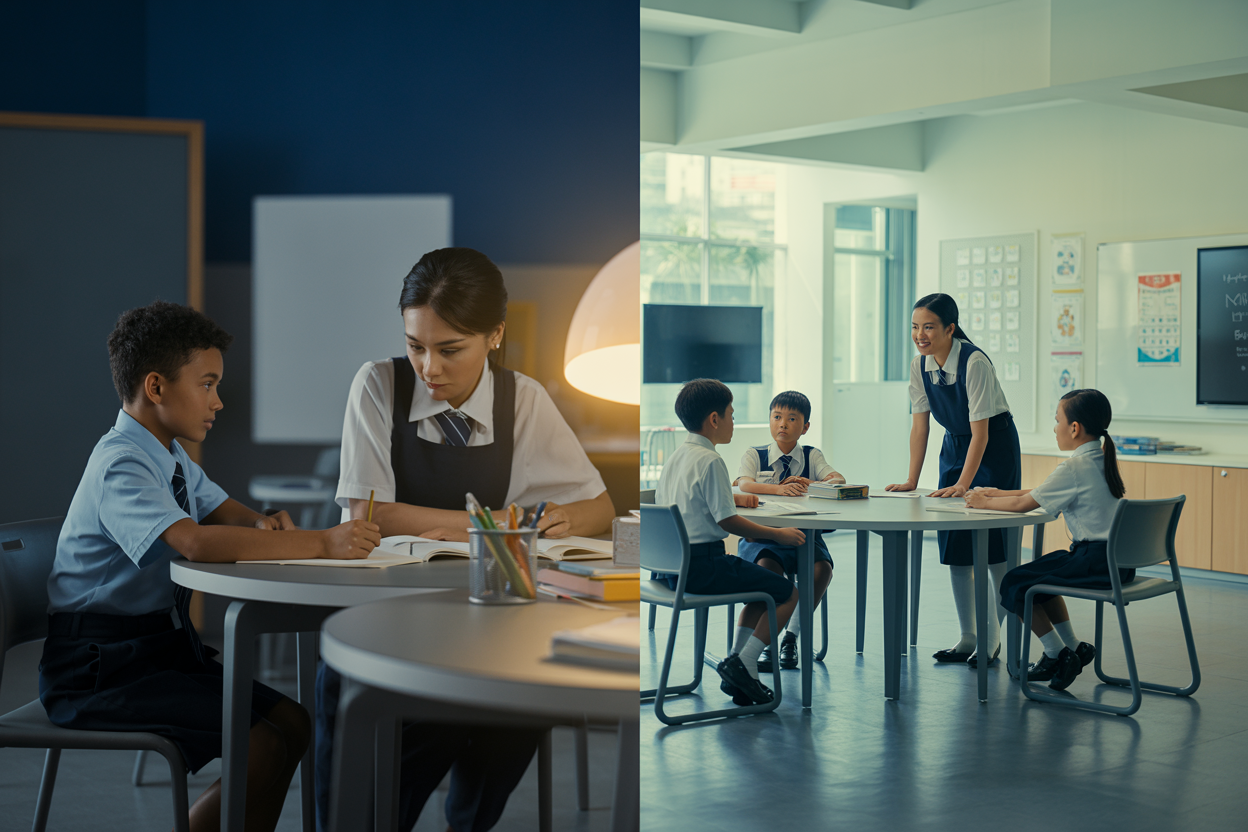- May 23, 2025 -
Making the Most Out of Parent-Teacher Conferences: A Comprehensive Guide for Singapore Parents

Table of Contents
- Introduction: Why Parent-Teacher Conferences Matter
- Before the Conference: Preparation is Key
- During the Conference: Maximizing Your Limited Time
- Essential Questions to Ask During Parent-Teacher Conferences
- Addressing Concerns Constructively
- After the Conference: Effective Follow-Up Strategies
- Building Ongoing Partnerships with Teachers
- How Supplementary Education Can Address Teacher Feedback
- Conclusion: Partnerships for Educational Success
Parent-teacher conferences represent one of the most valuable opportunities for meaningful collaboration between home and school. In Singapore’s competitive education landscape, these brief meetings can provide crucial insights into your child’s academic progress, social development, and classroom behavior. Yet many parents leave these sessions feeling that they didn’t get the information they needed or didn’t communicate their concerns effectively.
At EduFirst Learning Centre, we’ve observed that parents who approach these conferences strategically often gain the most beneficial outcomes for their children. Whether your child is excelling or struggling, these face-to-face meetings offer a chance to strengthen the educational partnership between parents and teachers that significantly impacts student success.
This comprehensive guide will walk you through practical strategies for before, during, and after parent-teacher conferences specifically within Singapore’s educational context. We’ll cover preparation techniques, key questions to ask, constructive approaches to addressing concerns, and effective follow-up methods that can transform these brief meetings into powerful catalysts for your child’s educational journey.
Before the Conference: Preparation is Key
The effectiveness of a parent-teacher conference often depends on how well you prepare. Singapore’s school calendar typically schedules these meetings once or twice a year, making each opportunity precious. Here’s how to ensure you’re ready:
Review Your Child’s Work and Reports
Before attending the conference, thoroughly review your child’s recent assignments, test results, and progress reports. Note patterns in strengths and weaknesses across subjects. In Singapore’s education system, where continuous assessment is common, look for trends rather than focusing on single assignments. This review will help you identify specific areas to discuss during the limited conference time.
Talk to Your Child Beforehand
Have a conversation with your child about their school experience. Ask open-ended questions like: “What do you enjoy most about school?”, “Which subjects feel challenging?”, or “Is there anything you wish your teacher knew about your learning?” Children often have valuable insights about their educational experience that may not be obvious from their schoolwork alone. This conversation can reveal concerns or strengths that should be addressed during the conference.
Prepare a List of Questions and Concerns
Parent-teacher conferences in Singapore schools typically last only 15-20 minutes. To make the most of this limited time, prepare a prioritized list of questions and concerns. Focus on the most important issues first, as time constraints may prevent discussing everything. Include questions about academic progress, social development, behavior, and any specific challenges your child might be facing.
Bring Relevant Materials
Organize any materials that might be helpful during the conference. This could include your child’s homework samples, previous report cards, or notes about specific incidents or concerns. If your child receives support outside school (such as at tuition centres like EduFirst), consider bringing relevant information about these interventions to provide a complete picture of your child’s educational support system.
During the Conference: Maximizing Your Limited Time
Singapore’s education system values efficiency, and parent-teacher conferences reflect this approach. Here’s how to make the most of your brief meeting:
Start with a Positive Attitude
Begin the conference by expressing appreciation for the teacher’s work. A positive, collaborative approach sets the tone for productive dialogue. Remember that both you and the teacher share the same goal: your child’s educational success. In Singapore’s respect-oriented culture, maintaining a cordial relationship with your child’s teacher is particularly important for ongoing collaboration.
Focus on Specific Examples
When discussing concerns or asking questions, reference specific examples rather than making general statements. Instead of saying, “My child is struggling with math,” you might say, “I noticed Chen had difficulty with these algebra problems on last month’s test.” Specific examples help teachers provide more targeted feedback and solutions. This approach is especially effective in Singapore’s detail-oriented educational environment.
Take Notes During the Conference
Bring a notebook and pen to record key points discussed during the meeting. These notes will be invaluable when following up on action items or discussing the conference with your child afterwards. In Singapore’s rigorous academic environment, tracking specific recommendations, strategies, and goals will help ensure nothing important gets overlooked in the implementation phase.
Manage Time Wisely
Be mindful of the time constraints. If you have several important issues to discuss, mention this at the beginning of the conference so the teacher can help prioritize topics. If time runs out before you’ve addressed all your concerns, ask about the best way to follow up—whether via email, a phone call, or a subsequent meeting. Singapore teachers often appreciate this consideration of their scheduled commitments.
Essential Questions to Ask During Parent-Teacher Conferences
Asking the right questions during parent-teacher conferences can provide valuable insights into your child’s educational experience. Here are some thought-provoking questions particularly relevant to Singapore’s academic environment:
Academic Progress Questions
Beyond grades and test scores, understanding your child’s learning process is crucial. Ask: “How does my child approach learning in class? Are they an active participant?” This reveals engagement levels beyond academic results. “Which subjects seem to spark my child’s interest most?” helps identify natural strengths. “Is my child performing at, above, or below grade level in each subject?” provides context beyond the Singapore ranking system. “How is my child handling the transition to this year’s increased academic demands?” acknowledges the progressive challenge of Singapore’s curriculum.
Social and Emotional Development Questions
In Singapore’s achievement-oriented culture, social-emotional development sometimes receives less attention than academics, but it’s equally important. Consider asking: “How does my child interact with peers during group work and free time?” “Does my child demonstrate resilience when facing challenges?” “How does my child respond to feedback or criticism?” and “Does my child seem happy and engaged at school?” These questions provide insights into your child’s emotional well-being and social integration, which significantly impact learning outcomes.
Behavior and Classroom Conduct Questions
Understanding your child’s behavior in the classroom environment reveals important aspects of their school experience. Effective questions include: “How does my child respond to classroom rules and expectations?” “Is my child organized with materials and assignments?” “Does my child ask questions when they don’t understand something?” and “How does my child handle transitions between activities?” These questions help identify potential areas for improvement in classroom conduct and learning habits.
Support and Improvement Questions
Finally, focus on forward-looking questions that can guide your support efforts: “What specific skills should we be reinforcing at home?” “Are there resources or activities you recommend to strengthen areas of difficulty?” “What strategies have you found effective in motivating my child?” and “How can we work together to address any concerns?” These questions demonstrate your commitment to the educational partnership and help establish concrete action plans for improvement.
Addressing Concerns Constructively
When concerns arise about your child’s academic performance, behavior, or well-being, how you communicate these issues can significantly impact the outcome. Singapore’s educational culture values harmony and mutual respect, which should guide your approach to difficult conversations:
Frame Concerns as Shared Goals
Rather than presenting concerns as complaints, frame them in terms of shared goals for your child’s success. Instead of saying, “My child is bored in math class,” try, “We’ve noticed Mei Lin completes her math work quickly at home. Are there ways we might provide additional challenges to maintain her engagement?” This approach acknowledges the teacher’s expertise while focusing on collaborative problem-solving rather than criticism.
Use the Sandwich Approach
When discussing sensitive issues, the sandwich approach can be effective: begin with a positive observation, address the concern, and then end with another positive note or constructive suggestion. For example: “We appreciate how you’ve helped improve Sarah’s writing skills this year. We’ve noticed she’s still struggling with time management during exams. What strategies might help her complete tests while maintaining the quality of her work that you’ve so effectively developed?”
Listen Actively to Teacher Perspectives
Teachers observe your child in a unique environment and may have insights that aren’t visible at home. When raising concerns, pause to listen to the teacher’s perspective before proposing solutions. Their professional experience and daily observations of your child in the classroom context are invaluable for understanding the complete picture. A receptive approach encourages more candid and helpful feedback.
Develop a Joint Action Plan
Conclude discussions about concerns by developing specific action steps that involve both school and home efforts. Clarify who will do what and when, and establish how progress will be monitored and communicated. This collaborative approach distributes responsibility appropriately and creates accountability for follow-through. In Singapore’s results-oriented educational environment, a clear plan with measurable outcomes is particularly effective.
After the Conference: Effective Follow-Up Strategies
The parent-teacher conference isn’t an endpoint but a launching pad for ongoing support and communication. Your actions following the meeting significantly impact its long-term effectiveness:
Discuss the Conference with Your Child
Share appropriate highlights from the conference with your child, emphasizing positive feedback and constructive suggestions rather than criticisms. Help your child understand the teacher’s perspective and expectations. In Singapore’s achievement-oriented culture, it’s particularly important to balance discussion of academic expectations with acknowledgment of effort and progress. Frame the conversation around growth and learning rather than just grades or rankings.
Implement Agreed-Upon Strategies
Put into action any strategies or supports discussed during the conference. This might include establishing new homework routines, providing specific types of practice, or implementing behavioral incentives. Be consistent with these approaches long enough to evaluate their effectiveness. If the teacher recommended specific resources or materials, procure these promptly to maintain momentum in addressing identified needs.
Monitor Progress and Maintain Communication
Keep track of how your child is responding to new strategies or support measures. Maintain appropriate communication with the teacher about progress, being mindful not to overburden them with excessive emails. Many Singapore schools use digital platforms for parent-teacher communication; familiarize yourself with these systems and use them appropriately. If you notice significant changes—either improvements or new concerns—share these observations with the teacher.
Express Appreciation
Send a brief thank-you email to the teacher after the conference, acknowledging their time and insights. This small gesture helps strengthen the parent-teacher relationship and demonstrates your commitment to the partnership. In Singapore’s education system, where teachers often manage large classes with significant academic demands, recognition of their efforts is particularly meaningful and helps establish a positive ongoing collaboration.
Building Ongoing Partnerships with Teachers
While formal parent-teacher conferences occur only periodically throughout the school year, building an ongoing partnership with your child’s teachers creates a supportive educational environment year-round:
Understand Communication Preferences
Every teacher has different preferences for communication. Some prefer email, while others might use apps, phone calls, or communication books. During the conference, ask about the teacher’s preferred communication method and typical response timeframe. Respecting these preferences demonstrates consideration for the teacher’s workflow. In Singapore schools, where teachers often manage multiple responsibilities beyond classroom instruction, efficient communication is particularly appreciated.
Participate in School Activities
Involvement in school events, parent volunteer opportunities, and educational activities provides additional contexts for informal interactions with teachers. These casual connections strengthen relationships and provide broader perspectives on the school community. In Singapore, participating in Parent Support Groups (PSGs) and school-organized events shows your commitment to the school community and provides valuable networking opportunities with other parents and educators.
Provide Relevant Updates from Home
Share significant changes or events in your child’s life that might affect their learning or behavior at school. Major developments such as family changes, health issues, or new interests can help teachers understand and support your child more effectively. Balance is important here—focus on information that has educational relevance rather than oversharing personal details.
Be Responsive to Teacher Outreach
When teachers reach out with updates, concerns, or requests, respond promptly and constructively. This responsiveness demonstrates that you value the communication and are actively engaged in your child’s education. In Singapore’s fast-paced educational environment, timely responses allow for quicker interventions when needed, potentially preventing small concerns from developing into larger issues.
How Supplementary Education Can Address Teacher Feedback
In Singapore’s educational landscape, supplementary education services like tuition centres play a significant role in supporting students’ academic development. Feedback from parent-teacher conferences can help direct these supplementary efforts most effectively:
Targeted Skill Development
When teachers identify specific skill gaps or areas needing reinforcement, supplementary education can provide focused attention on these aspects. For example, if a conference reveals challenges with problem-solving in mathematics, a quality tuition program like EduFirst Learning Centre can provide targeted exercises and alternative explanation approaches. The small class sizes (4-8 students) at EduFirst ensure that instructors can address these specific needs while still providing the benefits of collaborative learning.
Personalized Learning Approaches
Teacher feedback often includes insights about a student’s learning style or approach. Supplementary education services can leverage this information to tailor their methods accordingly. If a teacher notes that your child learns best through visual representations, for instance, a quality tuition provider will incorporate more diagrams, charts, and visual learning aids. EduFirst’s personalized education approach is specifically designed to accommodate different learning styles and needs.
Building Confidence in Challenging Areas
Parent-teacher conferences sometimes reveal subjects or topics where students lack confidence, even if they have the necessary abilities. Supplementary education in smaller group settings provides a low-pressure environment where students can build confidence through guided practice and success experiences. The supportive atmosphere at centres like EduFirst helps students develop positive associations with previously challenging subjects, often leading to improved classroom participation and performance.
Reinforcement of School Curriculum
Understanding what topics are being covered in school allows supplementary education providers to align their instruction for maximum impact. After parent-teacher conferences, sharing the teacher’s curriculum information with your child’s tuition centre ensures that supplementary lessons complement and reinforce classroom learning. EduFirst’s curriculum is designed to align with Singapore’s education system while providing additional depth and practice opportunities that the time constraints of regular classrooms might not allow.
By strategically utilizing supplementary education based on insights from parent-teacher conferences, you can create a comprehensive support system that addresses specific needs while reinforcing the school’s educational objectives. This coordinated approach maximizes the benefits of both school and supplementary instruction, creating a powerful synergy for your child’s academic development.
Conclusion: Partnerships for Educational Success
Parent-teacher conferences represent a valuable opportunity to strengthen the educational partnership that supports your child’s development. In Singapore’s achievement-oriented educational landscape, these brief but significant interactions provide insights that can guide your support efforts both at home and through supplementary education services.
The most successful parent-teacher conferences aren’t just about receiving information—they’re about establishing collaborative relationships. By preparing thoroughly, communicating effectively during the meeting, following up diligently, and maintaining ongoing connections, you transform these conferences from brief administrative events into powerful catalysts for your child’s educational journey.
Remember that teachers, parents, and supplementary education providers like EduFirst Learning Centre all share the same fundamental goal: helping students achieve their full potential. When these partners communicate effectively and work together consistently, students benefit from a cohesive support system that addresses their individual needs and challenges.
As you apply the strategies outlined in this guide, you’ll likely find that parent-teacher conferences become increasingly productive and insightful over time. This investment in educational partnership pays dividends not just in academic results, but in your child’s confidence, engagement, and love of learning—outcomes that extend far beyond report cards and exams to shape lifelong success.
Need Additional Support for Your Child’s Educational Journey?
At EduFirst Learning Centre, we specialize in personalized education that addresses individual learning needs. Our small class sizes of 4-8 students ensure that your child receives the attention and support they deserve. With 25 locations across Singapore, we’re ready to help your child excel academically and implement the strategies discussed with their school teachers.
Contact us today to learn how our experienced educators can provide targeted support based on your child’s specific needs and teacher feedback.



